What is a Recreational Vehicle? Let’s get back to basics with this guide to RVs
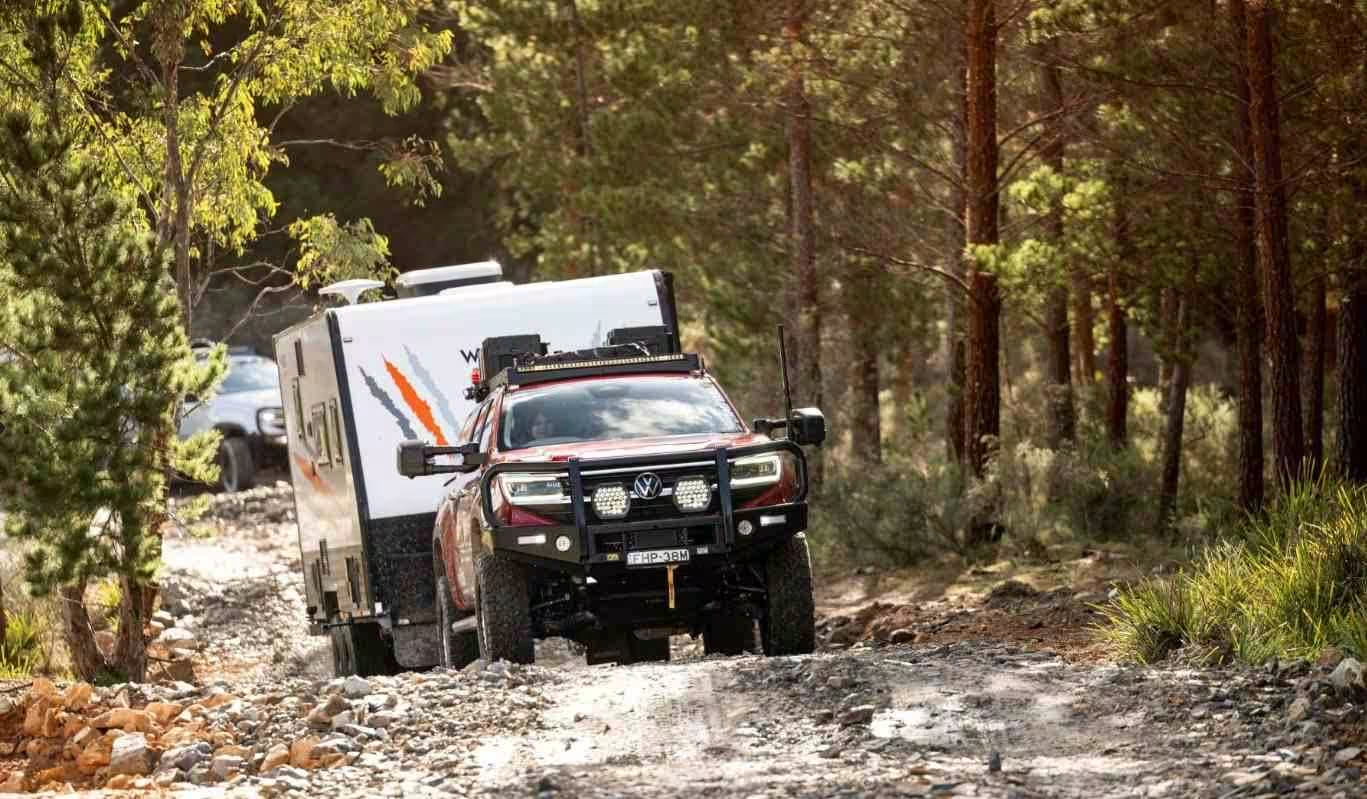



In Australia, asking what is a recreational vehicle (RV) yields a broad legal definition covering any motorised or towed vehicle designed for camping. While this umbrella term covers everything from camper trailers to converted coaches, Australians typically distinguish between ‘caravans’ (towed) and ‘motorhomes’ (driven). Crucially, licensing depends on weight, not the vehicle ‘class’.
If you have spent time on YouTube watching vehicle reviews, you have likely ended up confused. You hear Americans talking about “Class A pushers” and “Fifth Wheels”, while here in Australia we talk about “Campervans”, “Pop-tops” and “Expanders”.
To make matters worse, the legal definitions under Australian Design Rules (ADRs) often differ from common campsite terminology. Whether you want to buy your first tourer or just win a campfire debate, this guide breaks down exactly what is a recreational vehicle in the Australian context.
Much of the confusion around what is a recreational vehicle comes from the US market, which categorises motorised RVs into Class A, B, and C. While Australian manufacturers like Jayco or Avida occasionally use these terms, they do not determine your licence requirements.
In Australia, authorities care less about the “shape” of the body and more about the Gross Vehicle Mass (GVM). However, to help you translate the brochure, here is how the classes stack up.
In the US, this is the king of the road. In Australia, we typically call these “Converted Coaches” or “Large Motorhomes”. Examples include Winnebago styling or converted Greyhound buses.
The Reality: These vehicles almost always exceed 4.5 tonnes GVM. You cannot drive them on a standard car licence. You will need a Light Rigid (LR), Medium Rigid (MR) or even Heavy Rigid (HR) licence depending on the axles and weight.
This category defines what is a recreational vehicle for many solo travellers and couples. Australians know these simply as “Campervans”. Manufacturers build these within the existing body of a commercial van (like a Toyota HiAce, Mercedes Sprinter, or Ford Transit). They retain the original metal skin of the van without a separate box body.
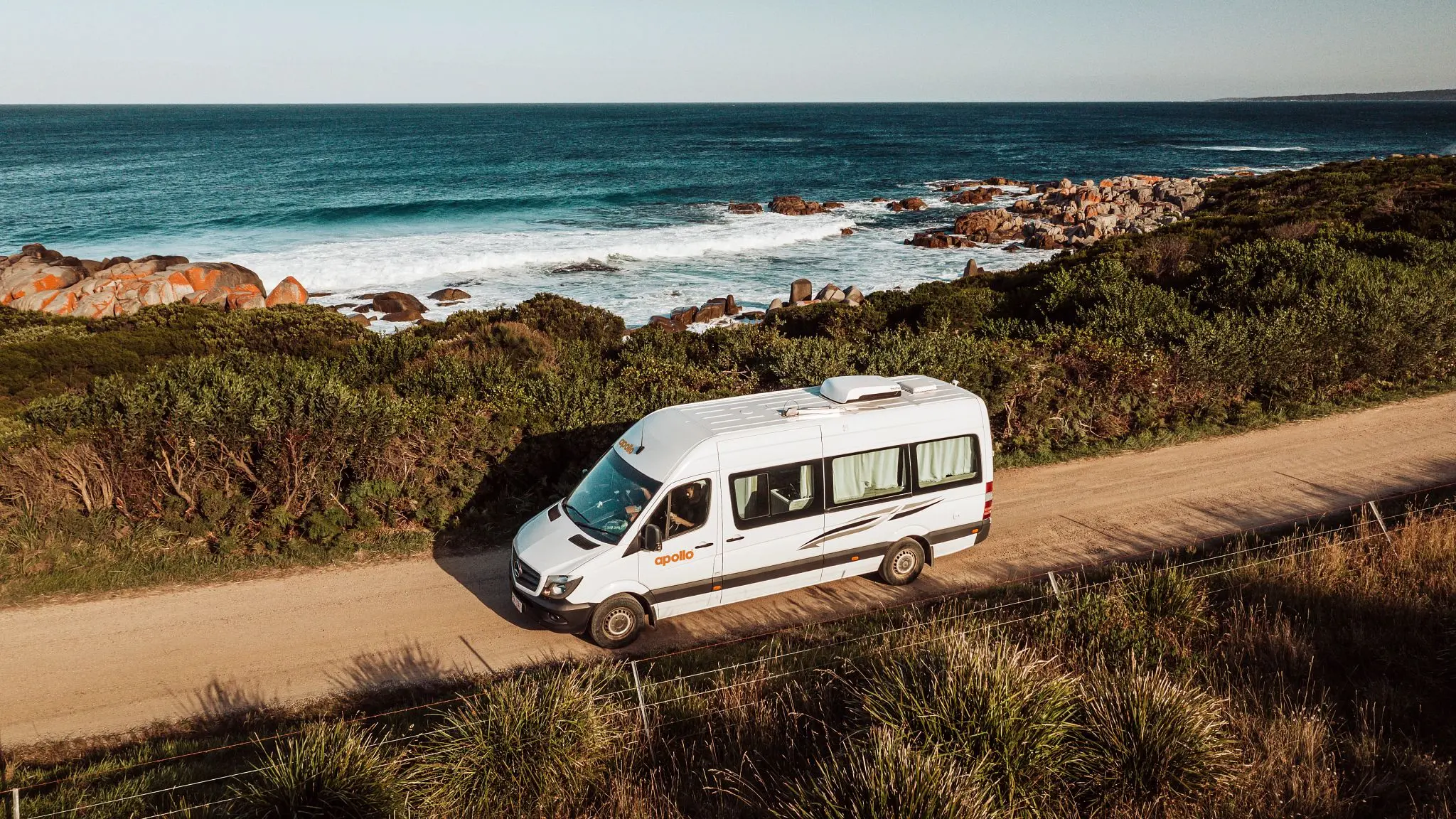
The Reality: These represent the most accessible entry point to RV life. The vast majority weigh under 4.5 tonnes, so you can drive them on a standard car licence.
This category causes the most confusion when asking what is a recreational vehicle. A “Class C” uses a cab-chassis (like a Fiat Ducato or Iveco Daily) with a specialised caravan body attached to the back. It usually features the distinctive “luton peak” (the bed over the driver’s cabin).
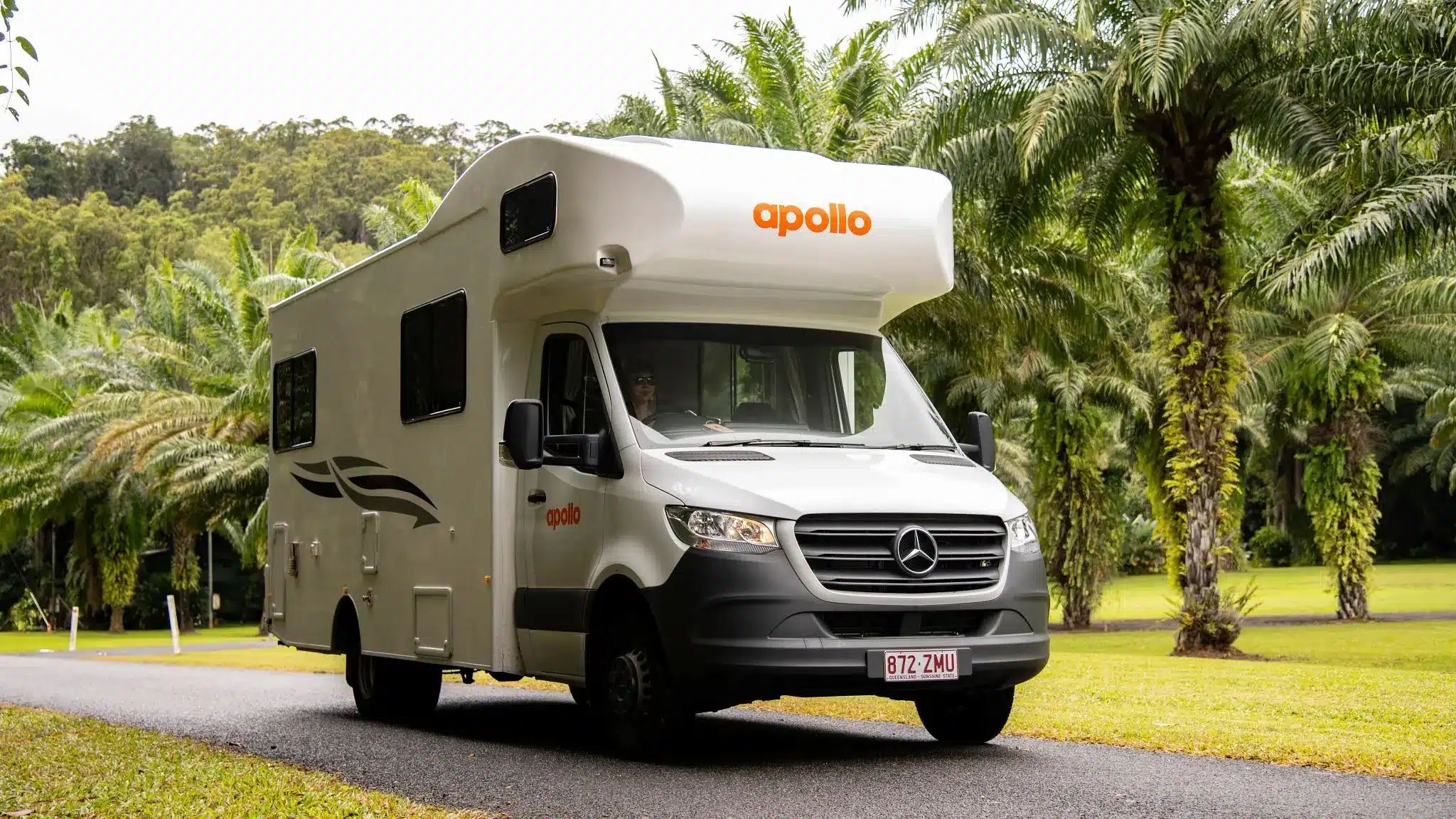
The Reality: In Australia, we just call these “Motorhomes”. Be careful here—manufacturers plate many modern motorhomes at exactly 4495kg to squeeze into the car licence category. However, larger models (especially Ivecos) often push into the Light Rigid (LR) category. Always check the compliance plate.
| US Term | Australian Equivalent | Typical Base Vehicle | Likely Licence Needed |
|---|---|---|---|
| Class A | Converted Coach / A-Class | Bus Chassis | LR, MR or HR |
| Class B | Campervan | Toyota HiAce, Sprinter Van | Car (C Class) |
| Class C | Motorhome (Coachbuilt) | Fiat Ducato, Iveco Daily | Car (C Class) or LR |
When we move away from engines and look at trailers, Vehicle Standards Bulletin 1 (VSB1) governs the definitions.
This is the legal umbrella term for almost every towable RV in Australia (except Fifth Wheelers). Technically, a “Pig Trailer” has one axle group near the middle, and the weight distributes between the wheels and the tow ball coupling.
However, walking into a dealership asking for a “Pig Trailer” will get you funny looks. In the consumer world, this class splits into three distinct categories:
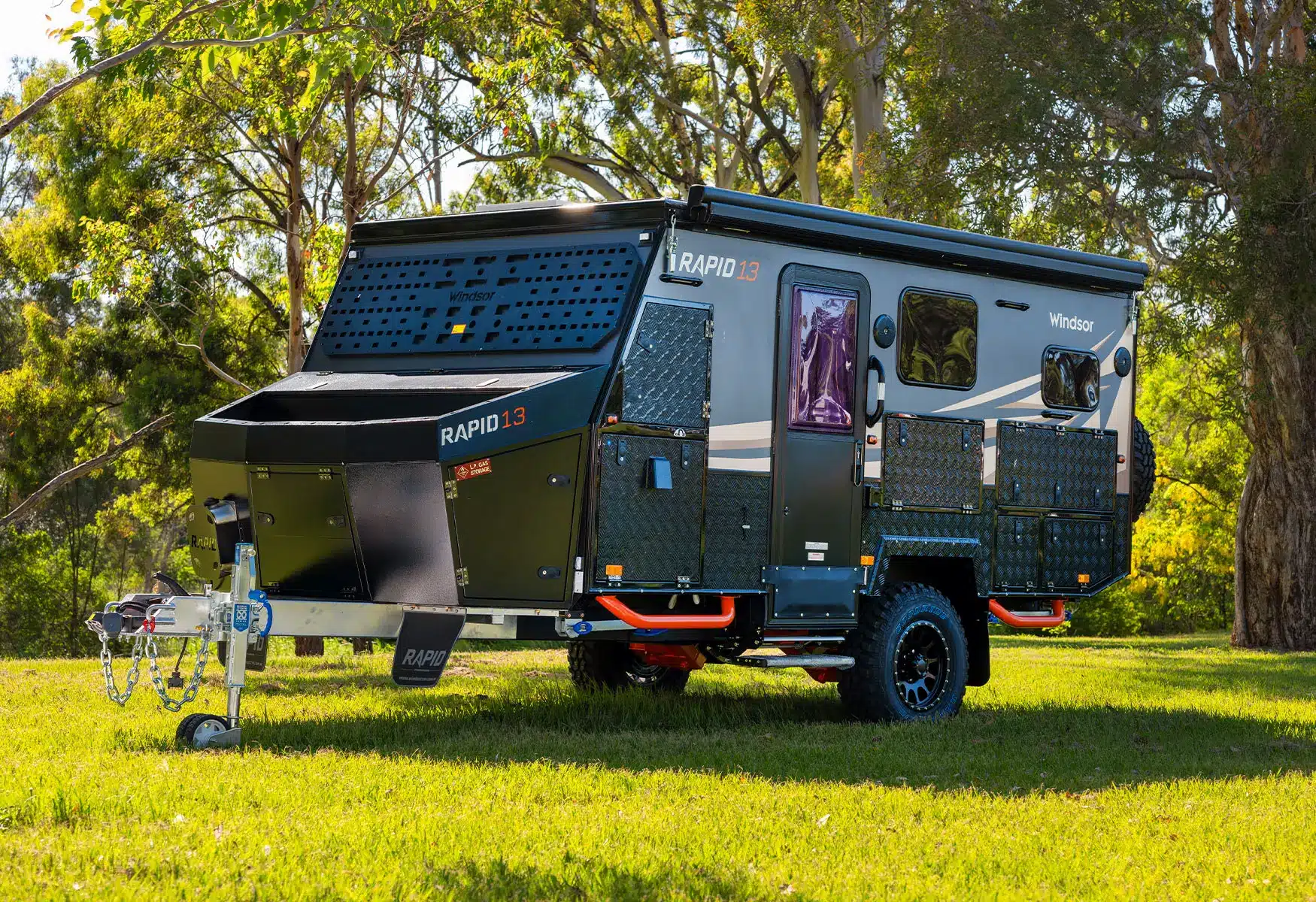
These are full-width trailers (usually 2.3m to 2.5m wide) designed for maximum internal living space. They usually have a full ensuite, permanent bed, and indoor kitchen. They are available as “Full Height” (fixed roof) or “Pop-Top” (roof lowers for storage/towing).
Hybrids bridge the gap between a camper trailer and a caravan. They feature hard walls (like a caravan) but generally have a narrower body (matching the width of a 4WD) and an external kitchen (like a camper). They are designed specifically for off-road use, offering the security of a caravan with the outdoor lifestyle of a camper.
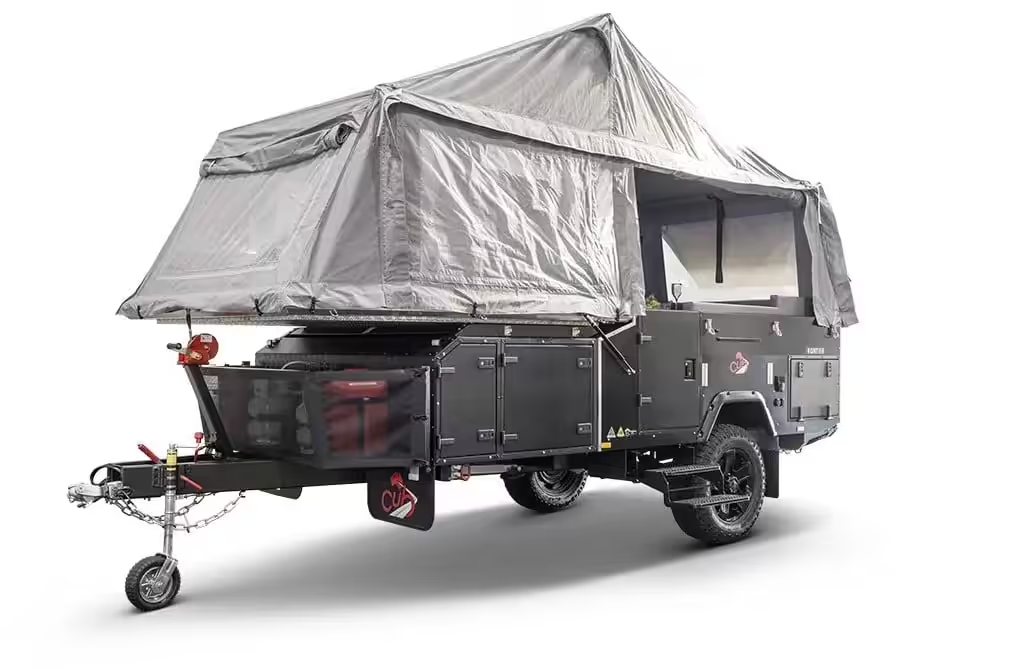
Camper trailers are defined by their compact travel size and canvas components. Whether they are “forward fold”, “rear fold”, or “soft floor”, they require setup time to expand the living space. They are lighter and offer less wind resistance than hybrids or caravans.

A Fifth Wheeler is technically a “Semi-Trailer”. The key difference is the coupling point, which sits above the rear axle of the tow vehicle (usually a ute or truck), rather than behind the bumper.
This design offers superior stability and eliminates caravan sway, but it eats up a massive amount of payload. Because ~20% of the trailer’s weight sits on the tow vehicle (compared to ~10% for a caravan), standard dual-cab utes (like a HiLux or Ranger) often cannot legally tow them once passengers are loaded. You will often need a specialized tow vehicle like a US pick-up or light truck.
If you look at a caravan manufactured after July 2023, you might notice the traditional silver VIN plate is missing. Under the new Road Vehicle Standards Act (RVSA), an entry on the Register of Approved Vehicles (RAV) has replaced physical compliance plates.
You can verify the details of any new RV by searching its VIN on the federal RAV database. This is critical for verifying the GTM and ATM weights of your van.
This is the most important section for staying legal and insured. In Australia, your ability to drive an RV depends entirely on its Gross Vehicle Mass (GVM), not just what the vehicle looks like.
Your standard Australian car driver’s licence (Class C) allows you to drive any vehicle with a GVM of up to 4.5 tonnes (4500kg).
This explains why manufacturers plate so many large motorhomes at exactly 4495kg. It is the manufacturing “sweet spot” to ensure the widest possible customer base. If you buy a motorhome with a GVM of 5200kg, you cannot drive it home on a car licence.
The National Heavy Vehicle Regulator (NHVR) sets the standards for heavy vehicles. If your RV exceeds the car licence limit, you will need to upgrade:
We have a full guide to towing weights, but here are the three definitions you must know to understand what is a recreational vehicle in terms of weight limits:
Do I need a special licence to drive a motorhome in Australia?
Only if the motorhome has a Gross Vehicle Mass (GVM) over 4.5 tonnes. If the GVM is 4500kg or less, you can drive it on a standard car (Class C) licence. If it is over 4.5 tonnes, you will need a Light Rigid (LR) licence.
Is a caravan considered a recreational vehicle?
Yes. When defining what is a recreational vehicle in Australia, the term applies to both motorised vehicles (motorhomes/campervans) and towed vehicles (caravans, camper trailers, fifth wheelers).
Can I drive a Winnebago on a car licence?
It depends on the model. Manufacturers build many smaller Winnebago models to stay under the 4.5-tonne limit for car licence holders. However, their larger ‘A-Class’ style vehicles often exceed this weight and require an LR or MR licence. Always check the compliance plate.